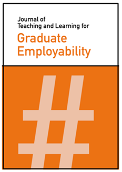Reconceptualising and supporting graduate employability practitioners for higher degree research candidates
DOI:
https://doi.org/10.21153/jtlge2024vol15no2art2043Keywords:
Higher degree research; candidate; master; PhD; professional doctorate; supervisor; employability; alternative doctoral training programAbstract
Research supervisors and their higher degree research (HDR) candidates – including Master, Professional Doctorate, and PhD candidates – make critical contributions to research and innovation. In addition to providing research training, research supervisors have traditionally also acted as the graduate employability practitioner for their HDR candidates through preparation for work in academia. However, the effectivness of traditional HDR training models (such as the knowledge transmission, master-apprentice model for PhD training) are being reviewed in Australia and elsewhere due to changes in the contemporary employment environment. These changes include: fewer available academic jobs; increased desire of HDR candidates for non-academic careers; and implementation of government policies aimed at increasing the return on research investment, including by increasing alignment of graduate attributes with contemporary employer needs. Consequently, work-integrated learning (WIL) activities are being incorporated into HDR degrees to broaden HDR training beyond acquisition of research-focussed skills. For effective incorporation of WIL into HDR degrees, recognition is needed of the different types and roles of graduate employability practitioners required by HDR candidates, as well as improvements to training support structures, and evolved metrics for assessment of supervisor and HDR candidate success.
References
Campbell, M., Leoni, R., Thomson, K., Tunny, R., Smith, L., & McAllister, L. (2021). The construction and testing of a framework to assure the institutional quality of work-integrated learning. International Journal of Work - Integrated Learning, 22(4), 505-519. https://www.ijwil.org/files/IJWIL_22_4_505_519.pdf
Department of Education. (2023). Research Block Grant Allocations. Australian Government. https://www.education.gov.au/research-block-grants/resources/2024-research-block-grant-allocations
Department of Education. (2024a). National Industry PhD Program. Australian Government. https://www.education.gov.au/national-industry-phd-program
Department of Education. (2024b). National Priorities and Industry Linkage Fund. Australian Government. https://www.education.gov.au/job-ready/npilf
Department of Education. (2024c). Research Block Grant calculations. Australian Government. https://www.education.gov.au/research-block-grants/calculating-research-block-grants
Department of Education, Skills & Employment. (2021, July). Growing industry internships for research PhD students through the Research Training Program - Implementation Paper. Australian Government. https://nla.gov.au/nla.obj-2996646362/view
Department of Education, Skills & Employment (2022) Higher Education Data Cube (uCube) Australian Government. https://highereducationstatistics.education.gov.au/Default.aspx
European Universities of Technology Alliance. (2024). The ENHANCE Micro-credentials give students’ the possibility to customise their education pathways according to their needs and ambitions. https://enhanceuniversity.eu/micro-credentials-enhance-universities-customise-students-education-pathways/
McGagh, J., Marsh, H., Western, M. C., Thomas, P., Hastings, A., Mihailova, M., & Wenham, M. (2016). Review of Australia's research training system. Report for the Australian Council of Learned Academies https://acola.org.au/wp/PDF/SAF13/SAF13%20RTS%20report.pdf
O'Connor, M. D. (2023). Design Principles for Work-Integrated Learning-Based, Alternative Doctoral Training Programs Informed by PhD Candidate Feedback. International Journal of Work-Integrated Learning, 24(4), 567-582. https://www.ijwil.org/files/IJWIL_24_4_567_582.pdf
O'Connor, M. D., Denejkina, A., & Arvanitakis, J. (2023). Preparing doctoral candidates for employment: Delivering research and employability skills training in the PhD via work-integrated learning. International Journal of Work-Integrated Learning, 24(1), 19. https://www.ijwil.org/files/IJWIL_24_1_19_42.pdf
O’Kane, M., Behrendt, L., Glover, B., Macklin, J., Nash, F., Rimmer, B., & Wikramanayake, S. (2024). Australian Universities Accord Final Report. Australian Government. https://www.education.gov.au/australian-universities-accord/resources/final-report
Pham, T. (2023). What really contributes to employability of PhD graduates in uncertain labour markets? Globalisation, Societies and Education, 1-12. https://doi.org/10.1080/14767724.2023.2192908
Sharmini, S., & Spronken-Smith, R. (2020). The PhD–is it out of alignment? Higher education research & development, 39(4), 821-833. https://doi.org/10.1080/07294360.2019.1693514
Spronken-Smith, R. (2018). Reforming Doctoral Education: There Is a Better Way.Center for Studies in Higher Education Research & Occasional Paper Series 9(18). https://escholarship.org/uc/item/4s08b4jx
Tertiary Education Quality and Standards Agency. (2022, May 4). Guidance note: Work-integrated learning. Australian Government. https://www.teqsa.gov.au/sites/default/files/guidance-note-work-integrated-learning-v2-0.pdf
UK Research and Innovation (2024, July 19). Centres for Doctoral Training. https://www.ukri.org/what-we-do/developing-people-and-skills/nerc/nerc-studentships/directed-training/centres-for-doctoral-training-cdt/
Downloads
Published
Issue
Section
License
Copyright (c) 2024 Michael O'Connor

This work is licensed under a Creative Commons Attribution-NonCommercial 4.0 International License.












